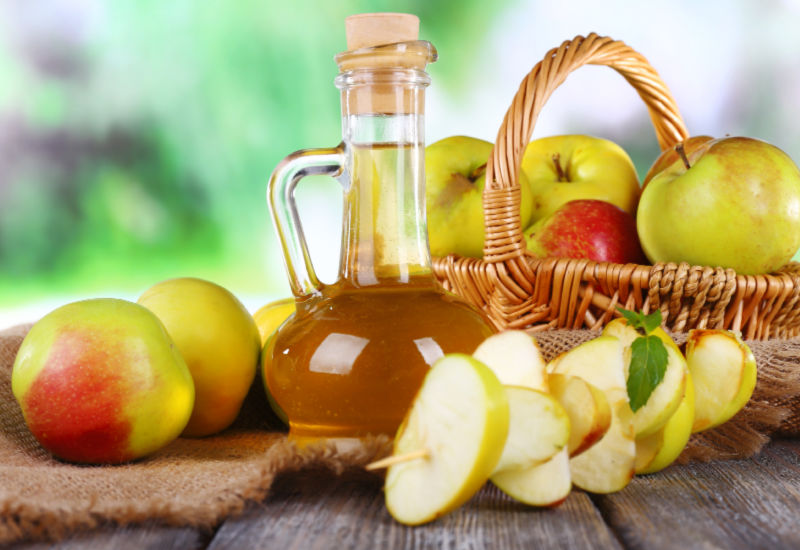Apple cider vinegar is a useful ingredient for adding a fresh acidic burst of flavor to savory or sweet food. The light golden liquid is ideal for dressings, canning, sauces, and pickling. Its more than just a flavor enhancer though. Added to food like pancakes, cakes, and other baked goods it works in unison with baking powder; they aerate the mixture, creating more lift and a better crumb.
If you don’t have any vinegar for your next recipe then you’ll need something to fill its place. In this article, we’re going to provide some good apple cider vinegar substitutes using everyday ingredients you may already have in the pantry. Let's take a closer look at the options.
Substitutes for Apple Cider Vinegar
Need to add slightly sweet, acidic flavor to your food but don’t have any apple cider vinegar? Here are the best options.
1. Unsweetened apple juice
Apple juice, without the addition of sugar, is a good alternative option if you want that hint of apple to carry through your cooking. Regular juice is too sweet and will put your food out of balance. You could also add a splash of lemon juice to raise the acidity.
2. Lemon juice
Lemon juice is a useful apple cider vinegar substitute thanks to its highly acidic nature. Its tart citrus flavor will bring a similar freshness to food and will work perfectly in sauces and dressings. Use equal amounts of juice as you’d use cider vinegar.
3. White wine
White wine won’t work in every situation in the kitchen, but it is an excellent option for deglazing a pan or any recipe where it gets cooked. Heating the wine will cook out the alcohol, leaving just the sweet freshness to remain.
Wine doesn’t have the same intensity as apple cider vinegar so we recommend doubling the quantity. Port or sherry would also work well for deglazing.
4. Balsamic vinegar
Balsamic vinegar has a strong tart and fruity taste with a little sweetness. Although it doesn’t share apple as the main ingredient, it does make a useful base for a vinaigrette. Go easy on the quantities to avoid overpowering the flavor profile.
5. White Vinegar
A common ingredient found in most kitchens, white vinegar is a handy replacement for apple cider vinegar. It offers a sharp sour punch to food, ideal for marinades and salad dressings. It can also be used in place of cider when making a kombucha starter culture.
White vinegar doesn’t share the fruity undertone, so if this is a problem then a squeeze of lemon or yuzu will help replicate the flavor.
White vinegar has a sharp taste and is more acidic so we’d recommend using a little less white vinegar than you would apple cider vinegar.
6. Rice Vinegar
Rice vinegar, or rice wine vinegar, is similar to apple cider vinegar as they both are on the slightly sweet side. It is an excellent backup option for soups, dressings, sauces, and rice-based meals. Although the addition of two teaspoons of lemon juice will help elevate the low ph-level of rice vinegar, it still isn’t suitable for pickling.
Use the same amount of rice vinegar as you’d use apple cider vinegar.
7. Malt Vinegar
Malt vinegar is made in a similar way to beer, so it has a distinct yeasty flavor. However, it shares similar acidity and mild sweetness that comes from apple cider vinegar. The malty flavor could be out of place is some recipes.
In a pinch, you could use malt vinegar in soups, casseroles, and dishes with lots of other ingredients to disguise its flavor. If you choose this substitute, use a little less malt vinegar.
Note: If you’re on a gluten-free diet then malt vinegar is not a suitable option.
8. White Wine Vinegar
White wine vinegar is an excellent all-purpose alternative that has similar acidity to apple cider vinegar. It is useful for pickling, breathing freshness into a gravy, or flavoring dressings.
Like most other options on this list, the addition of some citrus will help provide a well-rounded taste to your cooking. Use half the amount in cooking, then add more if you think it needs it.
9. Red Wine Vinegar
Red wine vinegar will have limited applications as a replacement, but it is useful for deglazing a pan or for a flavorsome vinaigrette. The grapes help add the fruity flavor that apple cider vinegar offers, but it isn’t as tart, meaning you’ll need to increase the amount you use by roughly 25%.
The replacement’s deep shade of red will make some dishes look unpleasant so choose when to use it carefully.
10. Lime Juice
Add citrusy acidic flavor to any food with the addition of lime juice. It is a nice alternative if you don’t have any lemons, or you enjoy its unique flavor in food. Use the same amount of lime juice as you’d use apple cider vinegar.
Fast facts about apple cider vinegar
- It is a multi-purpose ingredient that can also be used as a cleaning product, nutritional supplement, natural shampoo, and a skin tonic.
- The cider is made by fermenting crushed apples until alcohol is created, which eventually turns into acetic acid, the main active ingredient in vinegar.
- Apple cider vinegar contains healthful properties that can help kill harmful bacteria and lower blood sugar levels. Some people like to drink the vinegar on its own for its health benefits.
 Related reading:
Related reading:
What is the best cooking wine substitute?
What’s a good replacement for evaporated milk?
How to replace coconut extract in a recipe.
What can be used for an egg yolk substitute?
Summing up
If you’re trying to find an apple cider vinegar substitute for cooking then unsweetened apple juice, lemon juice, or white wine are all suitable replacements. We decided to include ten backups so you’ll probably have one at home already.
When working with substitute ingredients we suggest adding them in small amounts then taste testing. You can always add more if required, but it’s hard to fix the balance once too much has been added.
Do you have a recommendation that we can add to this list? Please let us know in the comments and we’ll check it out.


Leave a Reply